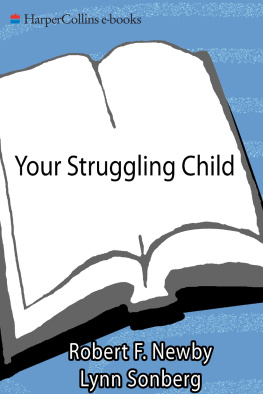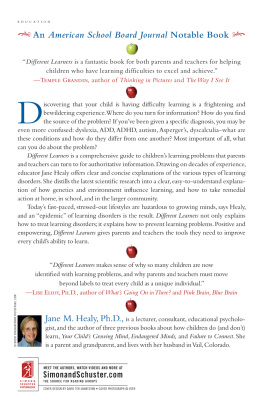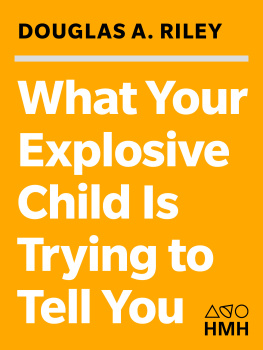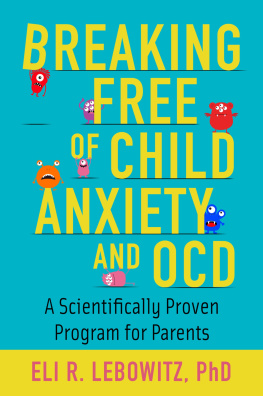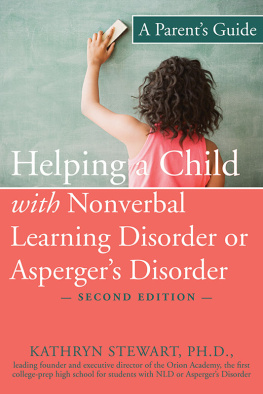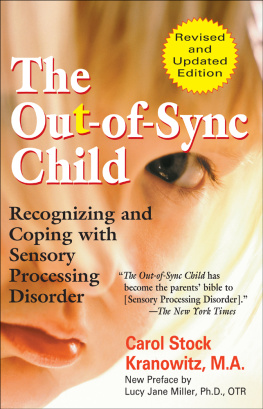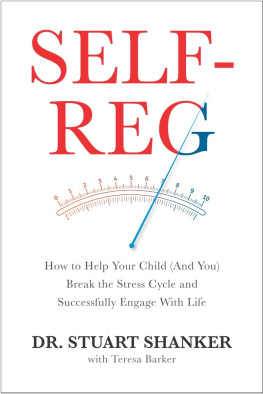Your Struggling Child
A Guide to Diagnosing, Understanding,
and Advocating for Your Child with Learning,
Behavior, or Emotional Problems
Robert F. Newby, Ph.D.,
with Carol A. Turkington
A LYNN SONBERG BOOK

T HIS BOOK contains advice and information relating to health care. It is not intended to replace medical advice and should be used to supplement rather than replace regular care by your doctor. It is recommended that you seek your physicians advice before embarking on any medical program or treatment.
All efforts have been made to ensure the accuracy of the information contained in this book as of the date published. The authors and the publisher expressly disclaim responsibility for any adverse effects arising from the use or application of the information contained herein.
The names and identifying characteristics of parents and children featured throughout this book have been changed to protect their privacy.
To all the dedicated parents
Contents
E ACH YEAR , as the mountain forests come alive again with spring, my wife and I take a walk in the woods. (Those of you who have read Bill Brysons humorous and insightful book by that title, A Walk in the Woods, will recognize the reference. If you havent read the book, I would heartily recommend it as a metaphor for the decision to become a parent.) We take our two dogs, load up our backpacks, and spend a week or so hiking a small section of the Appalachian Trail, choosing a different section each year.
To some extent, this popular trail, which stretches continuously over two thousand miles from Georgia to Maine, is easy to follow. All you have to do is keep your eye out for the white marks on the trees, about the size of an index card, that the trailblazers have painted regularly along the way. Its just like parenting: Your child wakes up every morning and tries to communicate to you what he or she needs, day after day, for thousands of miles. You just keep on walking with them.
But theres a problem. If your childs development, behavior, emotions, or learning skills arent going well, you need a lot more information in addition to the fact that he or she wakes up every day. In the same way, Donna and I find that we like to have more than the white marks on the trees as we hike. So what do we do?
We get a map.
This helps us with all sorts of issues, such as how steep the trail will be over the next few miles, where to find water along the way, and where we cross roads (so we can put the leashes on the dogs to keep them from running into traffic).
One year on our hike, we decided to save a few dollars and skip the map. Bad idea! Its not that we got lost. After all, the white marks on the trees kept going on and on, just as your children wake up every day and try to tell you what they need. But without the map, we didnt know what to expect. We got quite a shock when suddenly facing a steep hill... wondering how long the swamp would continue... wondering where the next watering hole might be, because we only knew what we could see a few hundred feet around us in the woods. We couldnt really plan when to rest or where we might set up our tent for the night. Now, we do enjoy surprises, but my wife will tell you that I got crabby at times, and all four of us got unnecessarily thirsty and exhausted.
If youre reading this book, youre probably concerned about your childs bumps, valleys, and swamps. Do you feel as if youre hiking in the rugged mountains without a map? Is the fact that you chose to be a parentjust as Donna and I choose to hike each yearnot completely enough when it comes to figuring out where youre headed?
Get a map.
Heres how.
Chapter 1
Helping You Better Understand Your Child
Y OU SENSE that your child has a problem. Maybe Jacks a whiz in math, but by second grade hes still not reading. Mary has a phenomenal vocabulary for a fourth grader, but shes still having trouble tying her shoes. Jody is a helpful eighth grader around the house, with lots of friendsbut hes constantly sitting in the principals office. At seventeen, Sally still cant pay attention long enough to finish her homework, so shes getting frustrated and discouraged. Or maybe you have a teenager who seemed to do fine in elementary school, but now that hes facing more challenging work in high school, hes starting to have problems and youre wondering if he has an undiagnosed learning disability.
You know something seems to be wrongbut what? So many times parents have told me, I just had a feeling that something wasnt right. All too often, parents with these vague concerns dont know what to do with their intuitive feelings. In some mild cases, a teacher may not mention your childs problems at all. At other times, a teacher may notice something going on at school that doesnt happen at home, and suddenly you get a surprise call from a teacher because your childs progress isnt what it should be. Here you were thinking everything was going well, and suddenly youve got a teacher with another point of view entirely.
If this sounds like your situation, take heart! Your feelings of confusion or uncertainty are really quite common, but so often unaddressed. The problem is that many behavioral or learning issues arent obvious or straightforward. Its hard for parents to figure out if their childs skills or behavior are simply at the far end of normal, or if the child really has a problem. And if your child does need helpwhere do you start?
That was the dilemma for Sandra, a single mom who was worried about her only child, seven-year-old Celeste. When Celeste was in kindergarten and first grade, she seemed fine, her mom reported. She made friends, enjoyed school, and was reading above grade level. But by the end of first grade, something had changed. Her teacher noticed that Celeste had started to withdraw and stare blankly out the window. She wouldnt eat lunch with her friends. By the third grade the problems had only gotten worse.
After a month of school that fall, her mother reported, her teacher called and said something had to be done. Celeste was acting spacey and was barely speaking in class. When the teacher asked her what was wrong, shed just shrug. I noticed these changes at home, too, Sandra said, but I didnt know what to do or where to turn.
Was Celeste just bored? Unchallenged? Slow? Could she have a brain disease?
The Guilt Game
Sandras story isnt unique. In fact, lots of parents sense something isnt quite right with their child about the same time that the child starts to have problems at school. Often, this begins in late preschool or in the early elementary grades. When you see your child struggle, its easy to feel guilty or worried. Parents ask themselves, Did we do something wrong? Are my childs problems my fault?
It can be even more upsetting if you think theres a problem, but the school either doesnt recognize a problem or shrugs off your valid concerns. At that point, youre left with a haunting dilemma: Is it me? Is my child actually okay? Am I just overreacting? Maybe the school knows best...
Between the confusion about what might be wrong and not knowing where to go for help or whom to ask, its not surprising that you feel lost, anxious, and frustrated. At this very moment, millions of children across the United States are falling behind in school or acting out impulsively at home. Some of these kids dont have any friends. They dont get along with their brothers and sisters. They may be troubled by dramatic mood swings; perhaps theyre hostile, hyperactive, listless, apathetic, easily distracted, withdrawn, antisocial, or destructive. And their parents are frustrated and afraid because they feel theyve lost control and they dont know how to find out whats wrong. They dont know where to turn for help, how to get a diagnosis, what treatments are available, or how to cope with their childs challenging behaviors and moods. They dont know whether their childs struggles are normal or abnormal.

